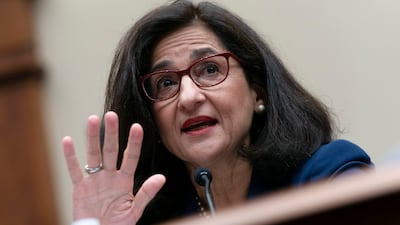The controversial former president of the US's Columbia University has been appointed as the UK’s chief economic adviser as Prime Minister Keir Starmer attempts to reboot his troubled government.
With Labour languishing in the polls and the British economy stuttering, Downing Street has decided to put Minouche Shafik in place as an adviser to help remedy the situation.
But the move has already attracted criticism with Ms Shafik’s reputation heavily damaged from her handling of the pro-Palestinian student protests last year at Columbia. The New York campus became the centre of the pro-Palestinian student protests over Gaza and sparked similar demonstrations at universities across the US, some of which turned violent.

After calling in the New York City Police Department (NYPD) to restore order, Ms Shafik resigned in August last year following months of criticism of her handling of the protests, and a much-publicised hearing before Congress during which she took a robust stand on the protests.
The combination of calling in the NYPD to the encampments twice, requesting a police presence for the end of the school year and cancelling the main graduation ceremony were part of the legacy she discussed on departure.
“This period has taken a considerable toll on my family, as it has for others in our community,” Ms Shafik stated in an email to staff and students on her departure. “It has also been a period of turmoil where it has been difficult to overcome divergent views across our community.”
Labour MPs have privately expressed misgivings about the Egypt-born British-American economist's appointment, with suggestions that if things go wrong, the focus will inevitably turn to her mishandling of the Columbia protests.
The Prime Minister’s official spokesman told The National that Ms Shafik brings more than “30 years of experience in public service and academia, the World Bank and the IMF”, and said “obviously she will have findings on a wide range of issues across that time”.
That experience includes stints as the chief civil servant at the former Department for International Development and as deputy governor of the Bank of England
Mr Starmer has also appointed the treasury minister Darren Jones, a rising star in the Labour Party, to the new role of Chief Secretary to the Prime Minister, “to drive forward progress in key policy areas”, Downing Street said.
In another move he has brought back another personality from the Tony Blair era, Tim Allan, who was Mr Blair's director of communications, to give his media strategy a shake-up. With decades of experience in PR, Mr Allan will become Executive Director of Communications, with a plan to deliver more polished messaging.
Last year Jonathan Powell, another important member of Mr Blair’s inner circle, was appointed as Britain’s National Security Adviser. He has had some success in addressing tough foreign policy issues.
But Labour is on 20 per cent in the polls and under severe pressure. The hard-right Reform party has surged to 35 per cent, with its tough anti-immigration message hitting home.
“We need to sharpen things up,” said a Labour official. “We’ve got to get things moving more quickly.”
A senior Labour insider also messaged The National to say that “the whole reshuffle is quite stark in that Starmer is shaking up his team (yet again) and at some point he is going to run out of people to blame”.


